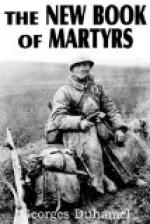When I sit down by his bed, he gives no sign of any pleasure at my visit. I ask him:
“What was your business in civil life?”
He does not answer immediately. At last he says: “Odd jobs; I carried and loaded here and there.”
“Are you married?”
“Yes.”
“Have you any children?”
“Yes.”
“How many?”
“Three.”
The conversation languishes. I get up and say: “Good-bye till to-morrow, Gregoire.”
“Ah! you will hurt me again to-morrow.”
I reassure him, or at least I try to reassure him. Then, that I may not go away leaving a bad impression, I ask:
“How did you get wounded?”
“Well, down there in the plain, with the others. ...”
That is all. I go away. Gregoire’s eyes follow me for a moment, and I cannot even say whether he is pleased or annoyed by my visit.
Good-bye, poor Gregoire. I cross the ward and
go to sit down by
Auger.
Auger is busy writing up his “book.”
It is a big ledger some one has given him, in which he notes the important events of his life.
Auger writes a round schoolboy hand. In fact, he can just write sufficiently well for his needs, I might almost say for his pleasure.
“Would you care to look at my book?” he says, and he hands it to me with the air of a man who has no secrets.
Auger receives many letters, and he copies them out carefully, especially when they are fine letters, full of generous sentiments. His lieutenant, for instance, wrote him a remarkable letter.
He also copies into his book the letters he writes to his wife and his little girl. Then he notes the incidents of the day: “Wound dressed at 10 o’clock. The pus is diminishing. After dinner Madame la Princesse Moreau paid us a visit, and distributed caps all round; I got a fine green one. The little chap who had such a bad wound in the belly died at 2 o’clock. ...”
Auger closes his book and puts it back under his bolster.
He has a face that it does one good to look at. His complexion is warm and fresh; his hair stiff and rather curly. He has a youthful moustache, a well-shaped chin, with a lively dimple in the middle, and eyes which seem to be looking out on a smiling landscape, gay with sunshine and running waters.
“I am getting on splendidly,” he says with great satisfaction. “Would you like to see Mariette?”
He lifts up the sheet, and I see the apparatus in which we have placed the stump of his leg. It makes a kind of big white doll, which he takes in both hands with a laugh, and to which he has given the playful name of “Mariette.”
Auger was a sapper in the Engineers. A shell broke his thigh and tore off his foot. But as the foot was still hanging by a strip of flesh, Auger took out his pocket-knife, and got rid of it. Then he said to his terror-stricken comrades: “Well, boys, that’s all right. It might have been worse. Now carry me somewhere out of this.”




